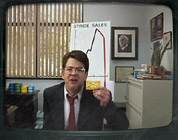The Office for Human Research Protections recently shut down a Johns Hopkins University program that had intensive care units across Michigan following “a simple five-step checklist designed to prevent certain hospital infections.”
research

Build An "Upgradeable" Home
Wired has a short article subtitled, “How our technolust helped bring down the housing market.” The article is more sensible than the headline, however—it really focuses on new developments in the housing market, and how expensive it is to retrofit even newly built homes with new (or future) technology: “‘[Remodeling] can be done, but you really need to want it,’ says Kermit Baker, a Harvard economist who studies the remodeling market.” What’s needed, the author argues, is an approach to new home construction that treats homes as dynamic spaces that can be more easily reconfigured to meet the requirements of new owners. Not that anyone is building a home right now, but it’s an interesting thing to keep in mind when you’re ready to leave your shantytown and re-settle in the suburbs.
../../../..//2007/11/19/dont-buy-a-house/
Don’t buy a house near an airport: a Swedish study has found a correlation between living near noisy airports and “an elevated risk of high blood pressure due to noise pollution.” [Reuters]

Health Record Privacy Law Is Messing Up Research
Just days after a deputy director of national intelligence told Americans that we need to rethink our concepts of privacy, comes news that it may, in fact, be harming us in the long run. In a recent national survey, nearly 70% of research scientists said the 2003 Health Insurance Portability and Accountability Act (HIPAA) is “impeding scientific research, stalling clinical studies and halting others altogether.”

Red Bull Gives Your Blood Pressure Wings
People who have high blood pressure might want to avoid energy drinks, because a new study suggests that they might interfere directly with blood pressure or hamper the effectiveness of medications. The drinks, which have high levels of caffeine and taurine (“an amino acid found in protein-rich foods like meat and fish that can affect heart function and blood pressure”), raise blood pressure and heart rates in healthy individuals, but not to dangerous levels. However, for people who have cardiovascular disease or are taking heart rate or blood pressure medication, the increase could be “significant.”

How Long Does Stride Chewing Gum Actually Last?
No commercial claim is so trivial that it can’t be tested and documented online, apparently, which is why Cheap Eats has performed a gum-chewing test for Stride gum, the brand that claims its flavor will last so long that gum sales will plummet and put the company out of business. (If that claim is true, we think there’s a shareholder lawsuit waiting to happen.) So how long does the flavor last? Somewhere around 30-45 minutes, depending on what you consider “flavor.”

Gum Company Paid ADA For Study That Earned It Their Seal Of Approval
For the first time ever, the American Dental Association is putting its seal on some Wrigley’s chewing gum products—they’ll now say that the ADA considers them products that are “clinically proven to help prevent cavities, reduce plaque acid and strengthen teeth.” The ADA and some health professionals say that this is a perfectly acceptable application of the seal, because a full study was carried out that proved the products work. The only problem is, the study was privately funded and the gum companies partially paid for them.

Pay More Attention To What You Eat At "Healthy" Restaurants
That councilwoman from L.A. isn’t going to like this: a new study says that when people eat at what they perceive to be “healthy” restaurants, they underestimate the calories, which could help explain why Americans are continuing to get fatter even as healthy restaurants have grown faster than fast food restaurants over the past 5 years.
../../../..//2007/09/12/researchers-find-that-shopping/
Researchers find that shopping malls can encourage healthier “incidental activity” by placing signs next to stairwells that read, “Take the Stairs,” which caused a 190% increase in stair activity over three weeks. Or, just do what most the stores in NYC do and make sure at least one escalator is out of service at all times. [Reuters]

Apparently Marketers Still Have A Lot To Learn
Adweek reports that in a recent Nielsen study of shoppers’ in-store behavior, even the study authors were surprised to discover how little some marketers seem to know about what works and what doesn’t. First, they determined how we shop for specific product categories:

The Secret To Being An Impulsive Shopper: Forget The Guilt
Are you an impulsive shopper? Odds are you don’t hang on to the guilt of “succumbing to temptation” the way more prudent shoppers do, says a new university study. The study found that thrill-seeking shoppers and careful shoppers alike feel guilty when they splurge on unnecessary goods, but over time thrill-seekers forget the guilt and only remember the high.

Are Drug Commercials Bad For Your Health?
“Most ads (82%) made some factual claims and made rational arguments (86%) for product use, but few described condition causes (26%), risk factors (26%), or prevalence (25%). Emotional appeals were almost universal (95%). No ads mentioned lifestyle change as an alternative to products, though some (19%) portrayed it as an adjunct to medication. Some ads (18%) portrayed lifestyle changes as insufficient for controlling a condition. The ads often framed medication use in terms of losing (58%) and regaining control (85%) over some aspect of life and as engendering social approval (78%). Products were frequently (58%) portrayed as a medical breakthrough.”
The researchers determined that big pharma advertisements don’t provide much factual information and Instead, rely on “characters that have lost control over their social, emotional, or physical lives without the medication.” We’re not scientists or anything, but we’ve noticed this too. —MEGHANN MARCO
Cell Phone Use Linked To Brain Tumors
- Long-term (10+ years) cellphone use has been linked with brain tumors. According to the study, people who had used cellphones for more than 10 years had a 40 percent higher chance than others of developing certain brain tumors. This news comes to us from the same British researcher who said that more research was needed to determine if there actually is a relationship between (long-term) cellphone use and cancer.

Your Doctor is Googling
“Two Australian doctors have found that entering the symptoms of a tricky case into the internet search engine often results in accurately diagnosing the illness.

Addicted to Cool: Menthol Cigarettes Are Harder to Quit
Is the minty freshness of menthol cigarettes more addicting than regular cigarettes?

AOL Research Closes
According to Greg Linden, founder of Findory and search industry professional, the AOL subdivision for releasing the user search histories has folded.

Who is Adhur Chowdhury?
Chowdhury wasn’t just “some rogue researcher” at AOL, according to his CV he was “Chief Architect.” As in, Chief Architect of Information. Among the accomplishments he achieved since May 2000, he includes:

AOL Higherups OK’d Search Record Release
The AOL company researcher who released the data is one Abdur Chowdhury, pictured at right, looking like a douche.


